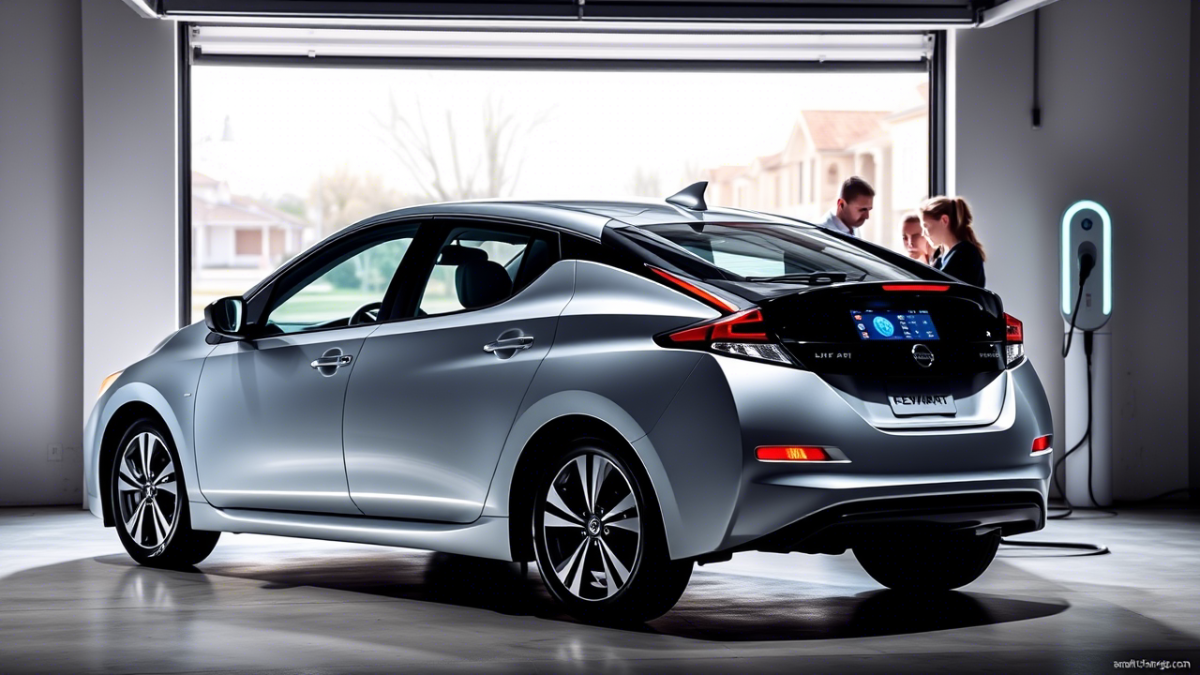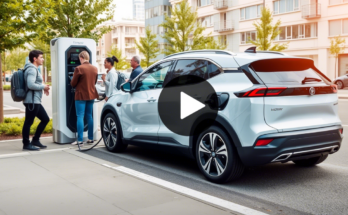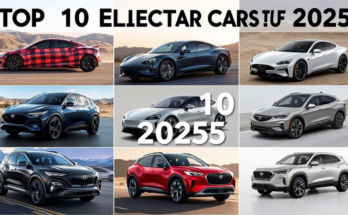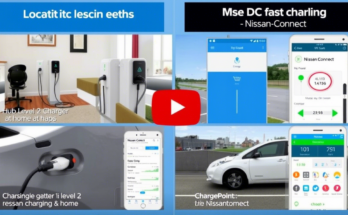In the rapidly evolving world of electric vehicles (EVs), few models, like the Nissan Leaf, have captured the public’s attention. As one of the pioneers in the mass-market EV space, the Nissan Leaf has consistently been a go-to choice for eco-conscious drivers seeking affordability, reliability, and cutting-edge technology. With its sleek design and impressive range of innovative features, the Nissan Leaf continues to dominate the EV market. This article will dive deep into reviews of popular EV models, focusing specifically on the Nissan Leaf. We will explore what makes it stand out, its pros and cons, and why it remains a top contender in the EV landscape.
Why the Nissan Leaf Matters in the EV Market
Before diving into detailed reviews, it’s essential to understand why the Nissan Leaf is so significant in the EV industry. Launched in 2010, the Leaf was one of the first fully electric cars available to the general public at an affordable price point. Over the years, Nissan has continuously refined the model, addressing consumer feedback and incorporating advancements in battery technology and vehicle performance.
The Nissan Leaf appeals to a broad audience, from urban commuters looking for a cost-effective daily driver to families seeking an environmentally friendly alternative to gas-powered SUVs. Its widespread adoption has made it a benchmark for other automakers entering the EV space, setting standards for affordability, efficiency, and user experience.
Key Features of the Nissan Leaf
To fully appreciate the Nissan Leaf, let’s explore some of its standout features that reviewers frequently highlight:
1. Range and Battery Technology
The range range is one of the most critical factors when evaluating any EV. The latest versions of the Nissan Leaf come with two primary battery options:
- Standard Range (40 kWh): Offers approximately 150 miles of rangeRangeended RangeRangekWh): Provides up to 226 miles on a single charge.
While these numbers may not compete with luxury EVs like Tesla’s Model S or Lucid Air, they are sufficient for everyday commuting and short road trips. Additionally, Nissan’s e-Pedal technology allows drivers to accelerate and decelerate using just one pedal, maximizing energy efficiency through regenerative braking.
2. Design and Build Quality
The Nissan Leaf boasts a modern, aerodynamic design that prioritizes aesthetics and functionality. Its compact size makes it easy to manoeuvre in tight city streets, while its spacious interior ensures all passengers’ comfort. High-quality materials and thoughtful ergonomics create a premium feel without breaking the bank.
3. Technology and Connectivity
Inside the cabin, the Nissan Leaf shines with its advanced infotainment system. A large touchscreen display is the centrepiece, offering seamless integration with Apple CarPlay and Android Auto. Drivers can also access NissanConnect Services, which include remote monitoring, navigation assistance, and real-time charging station locators.
Safety is another area where the Leaf excels. Equipped with Nissan’s ProPILOT Assist, the car offers semi-autonomous driving capabilities, including adaptive cruise control and lane-keeping assistance. These features provide peace of mind during long drives and busy commutes.
4. Charging Infrastructure Compatibility
Nissan has partnered with various charging networks to ensure Leaf owners have access to convenient charging solutions. Whether you’re plugging in at home, work, or a public station, the Leaf supports Level 1, Level 2, and DC fast charging. This flexibility reduces range anxiety and enhances the overall ownership experience.
Pros and Cons of the Nissan Leaf
No review would be complete without weighing the advantages and disadvantages of the Nissan Leaf. Here’s a balanced look at what potential buyers should consider:
Pros:
- Affordability: Compared to many competitors, the Nissan Leaf offers excellent value for money, especially considering its feature set.
- Proven Reliability: Over a decade of production history, the Leaf has established itself as a dependable EV.
- Eco-Friendly: Zero tailpipe emissions make the Leaf an environmentally responsible choice.
- User-Friendly Interface: The intuitive controls and tech-forward dashboard cater to drivers of all ages and skill levels.
- Government Incentives: Many regions offer tax credits or rebates for purchasing an EV like the Leaf, further reducing costs.
Cons:
- Limited Range (Compared to Premium EVs): While adequate for most users, the Leaf range is shorter than that of high-end models like Teslas or Hyundais.
- Lack of All-Wheel Drive Option: Unlike some rivals, the Leaf does not offer AWD, limiting its appeal in snowy climates.
- Resale Value Concerns: Like many EVs, the Leaf’s resale value depreciates faster than traditional gasoline vehicles due to advancements in EV technology.
Comparing the Nissan Leaf to Other Popular EV Models
When considering the Nissan Leaf, comparing it against other popular EVs is helpful. Below, we’ll examine how the Leaf stacks up against key competitors:
Tesla Model 3
The Tesla Model 3 is often viewed as the Leaf’s main rival due to its similar price point and target audience. However, there are notable differences:
- Range: Thanks to its larger batteries, the Model 3 offers significantly longer ranges (up to 358 miles).
- Performance: Tesla’s superior acceleration and handling give it an edge for enthusiasts.
- Supercharger Network: Tesla’s proprietary Supercharger network provides unparalleled convenience for long-distance travel.
The Leaf remains a strong contender for budget-conscious buyers who prioritize practicality over performance.
Chevrolet Bolt EUV
The Chevrolet Bolt EUV is similar to the Leaf in terms of affordability and range. Both vehicless excel in urban environments but lack the prestige associated with higher-end brands. Ultimately, the decision between the two comes down to personal preference regarding design, brand loyalty, and specific features.
Hyundai Kona Electric
The Hyundai Kona Electric offers specs comparable to the Leaf, including a robust range and solid build quality. However, the Kona’s quirky styling might not appeal to everyone, whereas the Leaf’s understated elegance has broader appeal.
Real-World User Experiences
To gain deeper insights into the Nissan Leaf’s performance, let’s turn to real-world user experiences. Many owners praise the Leaf for its smooth ride, quiet operation, and low maintenance costs. For instance, Sarah T., a Los Angeles-based commuter, shared her thoughts: “Switching to the Nissan Leaf was one of the best decisions I’ve made. It’s perfect for my daily commute, and I love knowing I’m reducing my carbon footprint.”

Conversely, some users express concerns about charging infrastructure outside major cities. John D., a resident of rural Texas, noted, “While I adore my Leaf, finding reliable charging stations near me can sometimes be challenging.”
These testimonials underscore the importance of assessing your lifestyle and location before committing to an EV purchase.
Tips for Maximizing Your Nissan Leaf Experience
If you decide to invest in a Nissan Leaf, here are a few tips to enhance your ownership experience:
- Install a Home Charger: Investing in a Level 2 home charger ensures quick and convenient overnight charging.
- Plan Long Trips Carefully: Use apps like PlugShare to locate charging stations along your route.
- Take Advantage of Incentives: Research federal, state, and local incentives to reduce upfront costs.
- Practice Efficient Driving Habits. Use the e-pedal and maintain steady speeds to maximize your range. Rangeclusion: Is the Nissan Leaf Right for You?
The Nissan Leaf is a testament to electric vehicles’ progress and potential. Its affordability, practicality, and innovation make it an ideal choice for a wide range of drivers. While it may not boast the most extended range, the Leaf delivers what most consumers need: a reliable, efficient, and enjoyable EV experience.
For those seeking a no-frills yet competent electric car, the Nissan Leaf deserves serious consideration. As the EV market continues to grow, the Leaf remains a shining example of how accessibility and sustainability can coexist harmoniously.
Whether you’re a first-time EV buyer or a seasoned enthusiast, the Nissan Leaf proves that going green doesn’t mean sacrificing style, comfort, or convenience. So, if you’re ready to embrace the future of transportation, take the wheel of a Nissan Leaf—and join the revolution!



